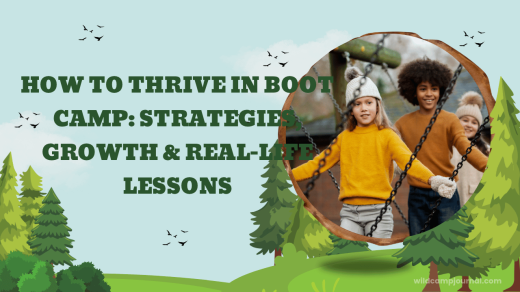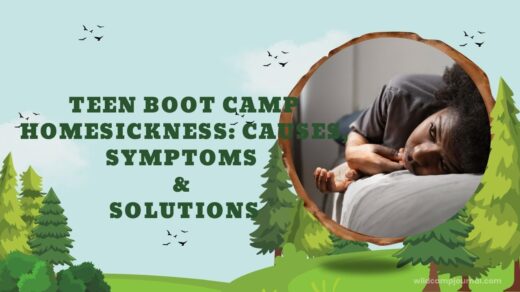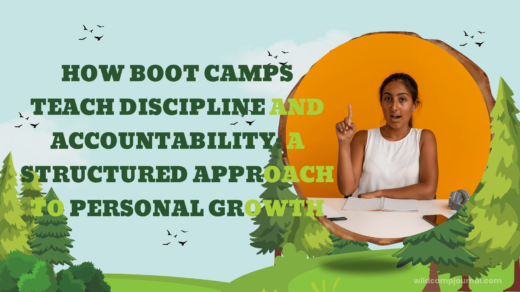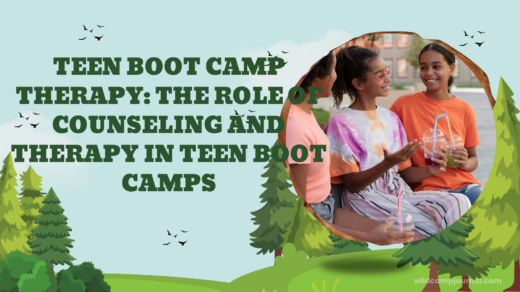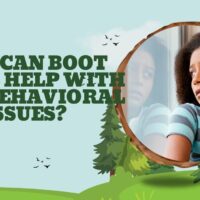Teenage years can be a turbulent time. From mood swings to defiance, it’s a period marked by emotional highs and lows.
Unfortunately, for some teens, these challenges evolve into behavioral issues that disrupt their lives, their families, and their communities.
As parents, educators, and caregivers struggle to manage these issues, many turn to alternative programs for support.
One such option that has gained popularity over the years is boot camps.
But can boot camps really help with teen behavioral issues?
Let’s dive into how these programs work, the benefits they offer, and what you should consider before choosing this path for your teen.
Table of Contents
Understanding Teen Behavioral Issues

Common Behavioral Problems in Teens
Behavioral problems in teens are a broad category that can encompass a variety of issues. Some of the most common include:
- Defiance: Refusing to comply with rules or authority figures, especially parents, teachers, or other adults.
- Substance Abuse: Experimentation or full-blown addiction to drugs or alcohol.
- Violence: Engaging in physical aggression, either at school, with peers, or at home.
- Reckless Behavior: Engaging in risky activities like dangerous driving or unsafe sexual practices.
- Poor Academic Performance: A drop in grades or a complete disengagement from school.
- Mental Health Issues: Anxiety, depression, or other untreated emotional issues.
Causes Behind These Issues
Understanding the causes of teen behavioral problems is essential for addressing them. These challenges can be influenced by various factors:
- Family Dynamics: Dysfunctional family environments, including divorce, abuse, or neglect, often contribute to behavioral problems.
- Peer Pressure: The desire to fit in or be accepted can push teens toward risky behaviors like substance use or violence.
- Mental Health: Undiagnosed or untreated conditions like ADHD, anxiety, or depression can manifest as behavioral issues.
- Social Media: Online bullying, unrealistic expectations, and excessive screen time can have detrimental effects on teens’ behavior.
- Hormonal Changes: Teenagers go through significant physical and emotional changes, which can cause impulsive and erratic behavior.
What Are Boot Camps for Teens?
Definition and Purpose of Boot Camps for Teens

Boot camps for teens are structured, intensive programs designed to help troubled adolescents address behavioral issues through a mix of discipline, physical activity, and counseling.
They typically focus on creating a strict routine, improving physical fitness, and teaching respect, accountability, and life skills.
The ultimate goal is to help teens overcome issues like defiance, substance abuse, or academic struggles and foster personal growth and discipline.
Here’s a breakdown of what these camps are all about:
- What Are Boot Camps for Teens?: Boot camps are structured programs aimed at helping troubled teens address a range of behavioral issues like defiance, substance abuse, and anger management. They combine discipline, physical activity, and therapeutic interventions in a controlled environment.
- Why Are Boot Camps Used?: The main purpose of boot camps is to provide teens with a fresh environment that encourages behavior change. They offer an alternative to traditional treatment options when other methods haven’t worked.
- Focus on Discipline and Structure: Boot camps create a strict daily routine that teaches teens how to follow rules, manage their time, and be accountable for their actions. Teens learn self-discipline through activities like physical exercise, group work, and goal setting.
- Physical and Emotional Challenges: These camps often include rigorous physical activities designed to push teens outside their comfort zones, which helps build resilience, mental toughness, and physical fitness. Emotional challenges, such as group discussions and individual counseling, help teens work through underlying issues.
- Behavioral Modification: Teens are taught how to replace negative behaviors with positive ones. Boot camps focus on addressing behaviors like defiance, disrespect, and impulsiveness by encouraging respect for authority and personal responsibility.
- Personal Growth and Responsibility: Through team activities and individual tasks, teens learn life skills such as problem-solving, leadership, and communication. They also work on building self-esteem, gaining confidence, and understanding their own potential.
- Helping Teens Break Negative Habits: Boot camps provide an opportunity for teens to break away from negative influences, such as bad peer groups or unhealthy family dynamics, which may contribute to their behavior problems.
- A Safe, Supportive Environment: These camps offer a safe place where teens can focus on their personal growth without the distractions and pressures of their regular lives. The structured environment is designed to help them feel secure while they work on themselves.
- Holistic Approach to Behavior Change: Boot camps address both the mental and physical aspects of a teen’s development, offering counseling and physical challenges to work on emotional growth, mental strength, and overall well-being.
- Building Skills for the Future: Boot camps help teens develop skills that will serve them well in adulthood, including time management, teamwork, leadership, and conflict resolution.
- Goal-Oriented Focus: Teens are encouraged to set and achieve personal goals, which gives them a sense of accomplishment and helps improve their overall self-perception.
- Offering a Fresh Start: For teens struggling to make positive changes, boot camps provide a fresh start, offering an opportunity to reset and gain new perspectives on their behavior.
By focusing on both discipline and personal development, boot camps aim to give teens the tools they need to overcome their behavioral issues and succeed in life.
History and Background of Boot Camps

The concept of boot camps originally stemmed from military training camps that focus on discipline and physical fitness. Over time, the model was adapted for at-risk teens.
These programs became popular in the 1990s as a solution for troubled teens, offering a more regimented and structured approach than traditional therapy.
Today, boot camps can vary widely in terms of their approaches, but most still maintain the core principles of discipline, physical activity, and personal development.
Boot camps for teens have evolved significantly over the years, shaped by societal needs, changing approaches to youth discipline, and various educational and therapeutic philosophies.
Below is a detailed look at the history and background of boot camps:
Origins of Boot Camps
Military Roots: The concept of boot camps for teens is heavily inspired by military-style training programs.
The military itself has used boot camps for centuries as a way to instill discipline, teamwork, and physical fitness in new recruits.
This highly structured environment, which includes rigorous physical activity, strict routines, and an emphasis on respect for authority, became the blueprint for teen boot camps.
Emergence in the 1980s: In the late 20th century, particularly in the 1980s and 1990s, boot camps for teens began to emerge in the United States as a response to increasing concerns about rising youth crime rates, drug abuse, and behavioral issues.
As traditional methods of discipline were perceived to be less effective, many believed that a military-style environment would help reform troubled teens.
The Rise of Juvenile Boot Camps
Early Programs: Juvenile boot camps were first introduced as a type of alternative sentencing for teens involved in criminal activities.
Instead of traditional incarceration, some judges began offering boot camp programs as a rehabilitation alternative, believing they could provide structure and discipline while offering a chance at reform.
Growth in Popularity: Throughout the 1990s, juvenile boot camps proliferated across the U.S. and other parts of the world.
They gained widespread popularity as they promised quick fixes for behavioral problems and were marketed as a tough, no-nonsense solution to delinquency and bad behavior.
Evolution and Adaptation
Diversification of Programs: Over time, the concept of boot camps expanded beyond correctional facilities to become more inclusive of therapeutic elements.
Many boot camps began integrating counseling, therapy, and life skills development, recognizing that teens struggling with emotional or psychological issues needed more than just physical discipline.
Shift from Punitive to Reformative Approaches: Initially, boot camps were seen largely as a punitive measure aimed at “breaking” defiant teens.
However, as more research and feedback emerged, many programs began to emphasize positive behavioral change through emotional support, personal growth, and resilience building.
The Role of Mental Health Professionals: In recent decades, boot camps have begun to recognize the importance of incorporating mental health professionals into their programs.
Counselors, therapists, and psychologists now play a key role in helping teens address underlying emotional issues like anxiety, depression, or trauma.
Controversies and Criticisms
Rising Criticism in the 2000s: As boot camps became more popular, their effectiveness and ethical implications came under scrutiny.
Critics argued that many boot camps were too harsh and could lead to abuse or harm, with some programs using excessively harsh physical punishment or emotional manipulation.
These concerns led to calls for stricter regulations and oversight of boot camp programs.
Legislative Changes: In response to these criticisms, many states in the U.S. implemented stricter guidelines and regulations for juvenile boot camps.
This included ensuring that boot camps were not excessively punitive and that proper mental health services were provided to address the underlying causes of behavioral issues.
Modern-Day Boot Camps
Combination of Discipline and Therapy: Today’s boot camps for teens are much more likely to combine elements of physical training with counseling, group therapy, and skill-building exercises.
These programs aim to balance discipline with emotional support, recognizing that teens may act out due to factors like peer pressure, family issues, or mental health struggles.
Focus on Holistic Development: Modern boot camps take a more holistic approach, with a focus on mental, emotional, and physical development.
They aim to teach teens life skills, problem-solving, and emotional regulation, not just obedience to authority.
Many programs have added components such as family counseling, leadership training, and community service.
Global Reach
Expansion to Other Countries: While boot camps for teens were initially a U.S.-centric phenomenon, they have since spread to other countries, including Canada, the UK, and Australia.
Each country has tailored its programs to suit its unique cultural and legal frameworks, but the core principles of structure, discipline, and personal development remain consistent.
Success Stories and Continued Popularity
Growing Popularity Among Parents: Despite the controversies, boot camps continue to be popular among some parents looking for solutions to difficult behavioral issues.
Many parents see them as a way to give their teens the structure and discipline they need, especially when other interventions have failed.
Focus on Resilience and Accountability: Today, successful boot camps emphasize building resilience, self-esteem, and accountability, helping teens develop the skills necessary to overcome obstacles and make positive changes in their lives.
The history of boot camps for teens shows how these programs have evolved from harsh military-style training camps into more balanced, therapeutic environments aimed at supporting teens through behavior modification, personal growth, and emotional healing.
Despite the controversies, boot camps continue to play a significant role in helping many teens improve their behavior and gain the tools they need to succeed in life.
How Do Boot Camps Work?

Typical Boot Camp Structure and Daily Schedule
A typical teen boot camp follows a structured daily routine that emphasizes discipline and accountability.
The daily schedule is rigorous, combining physical activities, mental challenges, and therapeutic sessions to address behavioral issues.
Here’s a breakdown of what a typical day at a teen boot camp looks like:
| Time | Activity | Details |
|---|---|---|
| 6:00 AM – 7:00 AM | Wake-Up and Morning Routine | Teens wake up early, make their beds, and tidy their living space. This teaches responsibility and discipline. |
| 7:00 AM – 8:00 AM | Physical Fitness and Exercise | Morning workout, such as running, strength training, or group exercises. Promotes physical health and teamwork. |
| 8:00 AM – 9:00 AM | Breakfast and Reflection Time | Group meal followed by brief reflection or journaling, setting intentions for the day ahead. |
| 9:00 AM – 11:00 AM | Structured Learning and Life Skills Sessions | Educational workshops on topics like anger management, emotional regulation, and goal setting. |
| 11:00 AM – 12:30 PM | Therapeutic Counseling and Group Therapy | Individual or group therapy sessions, guided by professional counselors to address emotional or behavioral issues. |
| 12:30 PM – 1:30 PM | Lunch and Rest Period | Group meal followed by brief downtime, allowing teens to relax or engage in quiet activities like reading. |
| 1:30 PM – 3:00 PM | Work Detail or Chores | Teens complete chores or work assignments, teaching teamwork, responsibility, and accountability. |
| 3:00 PM – 4:30 PM | Afternoon Activities and Skill Development | Leadership exercises, outdoor challenges, or skill-building workshops such as cooking or financial literacy. |
| 4:30 PM – 5:30 PM | Evening Reflection and Group Discussion | Review of the day’s experiences, sharing insights, and discussing challenges with mentors or peers. |
| 5:30 PM – 6:30 PM | Dinner and Relaxation | Group meal followed by downtime for teens to socialize, relax, or engage in recreational activities. |
| 6:30 PM – 8:00 PM | Free Time and Recreation | Teens can unwind with activities like sports, games, or hobbies to balance out the intensity of the day. |
| 8:00 PM – 9:00 PM | Lights Out and Bedtime | Lights out for teens to ensure adequate sleep for recovery and to prepare for the next day’s challenges. |
Key Elements of a Teen Boot Camp Schedule:
- Structured Routine: Each part of the day is designed to maximize discipline and productivity.
- Physical and Mental Development: Physical exercises paired with therapeutic counseling foster both body and mind.
- Life Skills and Responsibility: Activities, chores, and workshops teach real-world skills and promote accountability.
- Therapeutic Support: Professional therapy sessions help address emotional issues, guiding teens toward healthier behaviors.
- Accountability: Chores, work assignments, and team-building activities help instill responsibility and teamwork.
The structured daily schedule of a boot camp is designed to keep teens engaged and focused while fostering personal growth, discipline, and accountability.
It combines physical challenges with therapeutic support to address behavioral issues in a holistic way, ensuring that teens are equipped with the tools they need to succeed both during and after the program.
Types of Activities and Programs Offered
Teen boot camps are designed to provide a well-rounded experience that combines physical challenges, emotional development, and practical skills.
The variety of activities and programs aims to address behavioral issues, build resilience, and foster personal growth.
Below is a detailed look at the types of activities and programs typically offered:
Physical Training and Fitness Programs
- Daily Workouts: Teens engage in regular physical activities such as running, calisthenics, obstacle courses, and strength training. These exercises build physical endurance, discipline, and resilience.
- Team Sports: Activities like basketball, volleyball, or soccer are incorporated to promote teamwork and communication while also being enjoyable.
- Outdoor Challenges: Hiking, rope climbing, and survival skills training encourage teens to push their limits and develop confidence in overcoming physical challenges.
Discipline and Behavioral Training
- Strict Routines: Boot camps enforce a highly structured daily schedule, helping teens learn time management, responsibility, and discipline.
- Rule Adherence: Teens are taught to follow rules and respect authority through consistent reinforcement of consequences for behavior.
- Problem-Solving Exercises: Activities that simulate real-life challenges encourage teens to think critically, make decisions, and accept accountability for their actions.
Therapeutic and Emotional Support Programs
- Individual Therapy: One-on-one sessions with licensed counselors help teens explore and address personal issues such as anger, anxiety, or trauma.
- Group Therapy: Teens participate in guided discussions where they share experiences and learn from peers, fostering empathy and emotional connection.
- Family Counseling: Many boot camps offer family therapy sessions to repair strained relationships and improve communication within the family unit.
Leadership and Team-Building Activities
- Leadership Training: Teens are given opportunities to lead group activities, fostering self-confidence, decision-making skills, and responsibility.
- Group Challenges: Collaborative exercises such as escape rooms, trust-building games, or team construction projects promote cooperation and leadership.
- Peer Mentorship: Older or more experienced participants may mentor newer teens, helping them adjust to the boot camp environment and grow.
Academic and Educational Programs
- Tutoring Services: Some boot camps provide academic support to ensure teens stay on track with their education. This may include help with homework or specific subjects.
- Workshops on Study Skills: Teens learn time management, effective study habits, and organizational skills to improve academic performance.
- GED Preparation: For teens who are behind in their education, boot camps may offer courses to prepare for GED exams or other academic milestones.
Life Skills Development
- Practical Workshops: Teens learn essential life skills such as cooking, financial literacy, budgeting, and time management.
- Job Readiness Training: Activities like resume writing, job interview practice, and workplace etiquette prepare teens for employment.
- Conflict Resolution Skills: Programs teach teens how to manage disputes, communicate effectively, and find peaceful solutions to conflicts.
Recreational and Creative Activities
- Arts and Crafts: Painting, drawing, and other creative outlets allow teens to express themselves and develop new hobbies.
- Music Therapy: Some camps incorporate music lessons or therapeutic music sessions to help teens channel emotions productively.
- Nature Exploration: Activities such as camping, wildlife observation, or gardening connect teens with nature and promote mindfulness.
Social and Community Engagement
- Community Service Projects: Teens participate in volunteer work like cleaning parks, assisting at shelters, or organizing community events. This instills a sense of purpose and social responsibility.
- Public Speaking Exercises: Teens practice speaking in front of groups to build confidence and communication skills.
- Peer Support Circles: Regular meetings with peers encourage openness and mutual encouragement.
Specialized Therapy Programs
- Substance Abuse Counseling: For teens struggling with addiction, specialized programs focus on understanding triggers, building coping mechanisms, and creating recovery plans.
- Trauma-Focused Therapy: Activities designed to help teens process past traumas and develop healthy emotional responses.
- Anger Management Programs: Techniques such as breathing exercises, mindfulness, and role-playing help teens manage anger and frustration.
Skill-Building for Resilience
- Mindfulness and Meditation: Guided mindfulness sessions teach teens to focus, relax, and manage stress effectively.
- Survival Skills: Practical survival training like building shelters, starting a fire, or navigating terrain enhances problem-solving abilities and self-reliance.
- Crisis Response Training: Teens learn how to stay calm and act effectively in challenging or emergency situations.
Program Customization
Many boot camps tailor their programs to suit the needs of individual teens.
For Example:
- Teens with academic difficulties may receive more tutoring.
- Those with social anxiety may participate in programs focused on building social skills and confidence.
- Teens struggling with anger or emotional regulation may engage in additional therapy sessions.
Why Such Variety is Important
Boot camps provide diverse activities and programs to ensure that teens receive a holistic experience.
Each type of activity plays a unique role in helping teens:
- Build physical and mental toughness.
- Develop interpersonal and problem-solving skills.
- Learn practical skills for life outside of the boot camp.
Through these carefully designed programs, boot camps aim to empower teens to address behavioral challenges, rebuild self-confidence, and set a path toward a more positive and productive future.
Boot Camps vs. Other Behavioral Programs

Teen boot camps are just one option among various behavioral programs designed to address emotional, social, or disciplinary challenges in adolescents.
To understand their distinct role, it’s essential to compare them with other programs such as therapeutic boarding schools and wilderness therapy programs.
Each has unique methods, goals, and approaches suited to specific needs.
Comparison with Therapeutic Boarding Schools
Therapeutic boarding schools are long-term programs that combine education, therapy, and a supportive residential environment to address behavioral and emotional challenges.
Here’s how they compare with boot camps:
| Aspect | Boot Camps | Therapeutic Boarding Schools |
|---|---|---|
| Program Duration | Short-term, often 4–12 weeks | Long-term, typically 6 months to several years |
| Focus | Intense physical discipline and immediate behavioral correction | Holistic focus on academics, therapy, and emotional growth |
| Therapy Approach | Limited therapy, often in group sessions | Extensive therapy, including individual, group, and family sessions |
| Daily Structure | Highly regimented and physically demanding | Balanced routine with academic classes, therapy, and recreation |
| Environment | Strict, military-style | Supportive, nurturing, and educational |
| Target Audience | Teens with acute behavioral issues needing quick intervention | Teens with chronic emotional or academic challenges |
| Academic Component | Minimal or absent | Strong emphasis on education with accredited academic programs |
| Parental Involvement | Limited during the program | Significant involvement through family therapy and visits |
Which Teens Benefit More from Therapeutic Boarding Schools?
- Teens struggling with academic challenges alongside emotional or behavioral issues.
- Adolescents needing a supportive and structured long-term environment for growth.
- Families looking for a more nurturing and academically focused program.
Comparison with Wilderness Therapy Programs
Wilderness therapy programs use the natural environment to promote healing, self-discovery, and behavior change.
These programs are distinct from boot camps in several key ways:
| Aspect | Boot Camps | Wilderness Therapy Programs |
|---|---|---|
| Program Setting | Campus or facility with structured activities | Remote outdoor settings like forests, deserts, or mountains |
| Duration | Short-term, often 4–12 weeks | Medium-term, typically 6–12 weeks |
| Approach | Military-style discipline and structure | Therapeutic approach using nature as a healing environment |
| Therapy Integration | Limited, with some group sessions | Therapy is central, often led by licensed professionals |
| Physical Demands | Rigorous physical training and chores | Hiking, camping, and survival skills with therapeutic goals |
| Emotional Focus | Behavioral correction through discipline | Emotional growth through reflection, teamwork, and coping skills |
| Target Audience | Teens with defiance or disciplinary problems | Teens with emotional, social, or substance-related challenges |
| Parental Involvement | Often minimal during the program | Often includes family therapy and post-program support |
Who Benefits from Wilderness Therapy Programs?
- Teens dealing with anxiety, depression, or low self-esteem.
- Adolescents needing an immersive experience to reconnect with themselves and nature.
- Families seeking a therapeutic environment without the strict discipline of a boot camp.
Benefits of Boot Camps for Teen Behavioral Issues

Boot camps for teens provide a structured environment designed to address behavioral problems and promote personal growth.
By combining discipline, physical activity, and skill-building programs, they aim to correct negative behaviors and instill positive habits.
Let’s explore the core benefits in greater detail.
Positive Discipline and Structure
One of the primary benefits of boot camps is their focus on discipline and creating a structured routine that supports behavioral improvement.
Here’s how this works:
- Clear Rules and Expectations: Boot camps establish strict rules that teens must follow, which helps them understand boundaries and the importance of respecting authority.
- Consequences for Actions: Teens learn that actions have consequences—both positive and negative—through a system of rewards for good behavior and penalties for poor choices.
- Daily Schedules: A regimented schedule ensures that teens stay engaged throughout the day, reducing idle time that could lead to negative behaviors. Structured routines also instill time-management skills.
- Accountability Practices: Teens are held accountable for their actions, encouraging them to take responsibility for their decisions and behavior.
- Focus on Self-Discipline: Over time, the external enforcement of discipline evolves into internal self-regulation, as teens adopt the principles they’ve learned into their everyday lives.
By emphasizing consistency and order, boot camps help teens build a foundation for improved behavior that can extend beyond their time in the program.
Skill Development and Character Building
Boot camps go beyond addressing immediate behavioral problems by fostering the development of essential life skills and building character.
Here’s what teens gain:
- Problem-Solving Skills: Activities and challenges are designed to push teens to think critically and find solutions independently or collaboratively.
- Leadership Opportunities: Teens often take on leadership roles in group activities, helping them develop decision-making skills and confidence in guiding others.
- Teamwork and Cooperation: Group tasks encourage collaboration and teach teens to work effectively with peers, a vital skill for future relationships and employment.
- Emotional Regulation: Through counseling and guided exercises, teens learn to manage emotions like anger, frustration, or anxiety, improving their interactions with others.
- Work Ethic: Completing assigned tasks, chores, or work details teaches perseverance and the value of hard work.
- Character Strengthening: By facing challenges head-on, teens build resilience, courage, and determination. These qualities shape their ability to handle future difficulties constructively.
Boot camps aim to help teens emerge not just with better behavior but as more well-rounded individuals equipped with skills to navigate life’s complexities.
Physical Fitness and Mental Toughness
Physical activities are central to the boot camp experience, offering benefits that extend beyond fitness.
Let’s dive deeper:
- Building Physical Strength and Endurance: Teens participate in rigorous exercises such as running, obstacle courses, and strength training, which improve their physical health and stamina.
- Improved Overall Health: Regular exercise helps combat sedentary habits and promotes a healthier lifestyle, including better sleep and stress reduction.
- Stress Relief Through Activity: Physical exertion acts as a natural outlet for stress and pent-up emotions, leaving teens calmer and more focused.
- Mental Resilience: Physical challenges teach perseverance and grit. For example, completing a difficult obstacle course helps teens recognize their capability to overcome obstacles, both physical and emotional.
- Increased Confidence: Achieving physical milestones, such as improving fitness levels or mastering a new skill, boosts teens’ self-esteem and sense of accomplishment.
- Group Fitness Dynamics: Group workouts foster camaraderie and support among participants, encouraging teamwork and motivating teens to push their limits.
The combination of physical activity and mental focus helps teens not only build healthier bodies but also develop a strong, determined mindset to tackle challenges.
Why These Benefits Matter
The structured discipline, skill-building opportunities, and emphasis on fitness provided by boot camps can transform teens’ outlooks and behaviors.
By focusing on positive growth, these programs aim to:
- Provide teens with tools to navigate challenges and conflicts in healthier ways.
- Develop habits and skills that will serve them in education, careers, and relationships.
- Foster a sense of accomplishment and self-worth, helping teens rebuild their confidence and move forward with a renewed sense of purpose.
Boot camps offer a focused, intensive environment that encourages teens to step out of their comfort zones, face their struggles, and emerge as more capable and resilient individuals.
Building Resilience and Accountability

Resilience and accountability are critical traits for teenagers struggling with behavioral issues.
Boot camps are uniquely designed to instill these qualities through structured programs, physical challenges, and a disciplined environment.
Let’s break down how these programs cultivate these essential life skills.
How Boot Camps Instill Resilience in Teens
Resilience is the ability to recover from setbacks, adapt to challenges, and keep pushing forward despite obstacles.
Boot camps aim to foster this quality by placing teens in situations that require them to step outside their comfort zones and build inner strength.
Facing Physical Challenges
- Teens participate in demanding physical activities such as obstacle courses, endurance runs, and group challenges.
- These activities require grit and determination, helping teens realize their capacity to persevere under pressure.
- Overcoming these challenges creates a sense of achievement, reinforcing their ability to handle difficult situations in life.
Promoting Problem-Solving and Adaptability
- Boot camps often simulate real-world scenarios that require teens to think critically and adapt quickly to changing circumstances.
- Whether navigating a team-building exercise or resolving a simulated crisis, teens learn to remain calm under pressure and find solutions.
Encouraging Emotional Growth
- Through guided group discussions and occasional individual therapy, teens confront emotional obstacles such as fear, frustration, or self-doubt.
- By facing and processing these emotions, teens develop emotional resilience, allowing them to handle future challenges with greater composure.
Building Incremental Success
- Boot camps set clear, achievable goals for participants, such as improving fitness levels or mastering a new skill.
- Each small success builds confidence and reinforces a “can-do” attitude, making teens more resilient to future setbacks.
Providing a Safe Space for Growth
- The controlled and supervised environment of boot camps ensures that challenges are difficult but manageable, allowing teens to grow without the risk of overwhelming failure.
Importance of Accountability in Behavioral Change
Accountability is a cornerstone of lasting behavioral change.
Boot camps emphasize personal responsibility, teaching teens to own their actions and understand their consequences.
Learning from Consequences
- Boot camps enforce strict rules with clear consequences for breaking them. For instance, skipping a task might result in additional chores or physical exercises.
- Teens quickly learn that their actions have direct outcomes, fostering responsibility.
Journaling and Self-Reflection
- Many boot camps include journaling or reflective exercises, encouraging teens to analyze their choices, emotions, and behaviors.
- These activities help teens develop self-awareness, a crucial element of accountability.
Group Accountability
- Teens often work in teams for group tasks, where the performance of one impacts the entire team.
- This dynamic teaches them to consider how their actions affect others and instills a sense of responsibility toward peers.
Ownership of Progress
- Boot camps track individual progress in areas like physical fitness, discipline, and skill development.
- Teens are encouraged to take ownership of their improvement, reinforcing the idea that effort leads to rewards.
Daily Check-Ins
- Regular one-on-one or group discussions with camp leaders allow teens to discuss their behavior, choices, and progress.
- These check-ins ensure teens remain accountable for their actions and provide opportunities for corrective guidance.
Building Trust and Integrity
- By taking responsibility for their actions, teens begin to rebuild trust with authority figures, peers, and family members.
- This trust becomes the foundation for stronger, more positive relationships in their lives.
Why Resilience and Accountability Matter
Together, resilience and accountability prepare teens for the challenges of adulthood by instilling a mindset that emphasizes growth, perseverance, and responsibility.
Resilience Helps Teens Overcome Challenges:
- Life is filled with obstacles, and the ability to bounce back is essential for personal and professional success.
- Teens who develop resilience are more likely to navigate tough situations like academic pressures, social conflicts, or career setbacks.
Accountability Builds Stronger Relationships:
- Taking responsibility for one’s actions fosters trust and respect in relationships with family, friends, and peers.
- Teens who understand accountability are better equipped to resolve conflicts and build meaningful connections.
Combining Both Leads to Self-Reliance:
- Resilient teens who hold themselves accountable are more likely to take initiative, set goals, and work toward achieving them without constant oversight.
Boot camps provide a transformative environment where teens can develop these essential traits, setting them on a path toward becoming self-reliant, responsible, and adaptable individuals.
These skills are not only critical for overcoming current behavioral challenges but also for thriving in the future.
Improving Self-Esteem and Confidence

One of the most transformative aspects of boot camps for teens is their ability to enhance self-esteem and boost confidence.
These programs provide structured opportunities for teens to recognize their value, build belief in their abilities, and experience personal growth.
Through intentional activities, supportive guidance, and tangible achievements, boot camps help teens develop a healthier self-image and greater self-worth.
Programs Focused on Self-Worth and Confidence
Boot camps design activities and environments to emphasize personal growth, self-discovery, and skill development, which directly impact how teens perceive themselves.
Here’s how these programs foster self-worth:
Structured Challenges to Build Success
Teens are assigned tasks or challenges that initially seem daunting but are achievable with effort and perseverance. Completing these tasks reinforces the belief that they are capable of succeeding in difficult situations.
Encouraging Positive Reinforcement
Boot camps prioritize positive reinforcement, celebrating successes, improvements, and efforts rather than just focusing on shortcomings. This recognition boosts morale and confidence.
Safe Space for Exploration
The controlled environment of a boot camp allows teens to explore their strengths and weaknesses without fear of harsh judgment. This helps them identify and appreciate their unique qualities.
Team-Based Activities
Collaborative tasks emphasize each teen’s contribution to the group’s success, helping them see their value in a team dynamic and improving social confidence.
One-on-One Mentorship
Many boot camps include personal mentorship or coaching sessions where teens receive guidance and encouragement tailored to their unique challenges and strengths. This personalized support can significantly boost self-esteem.
Goal Setting and Achievement
Programs encourage teens to set small, realistic goals and celebrate incremental progress. The process of setting, striving for, and achieving goals helps build a sense of self-worth.
Role Modeling
Boot camps often employ staff who serve as positive role models, demonstrating qualities such as resilience, compassion, and confidence. Teens learn by example and are inspired to emulate these behaviors.
Achievements and Their Impact on Self-Perception
Success, whether big or small, has a profound impact on how teens view themselves.
Boot camps are designed to offer regular opportunities for achievement, and these successes serve as milestones for improving self-perception.
Accomplishment of Physical Goals
- Activities like completing an obstacle course, improving fitness levels, or mastering a new skill (e.g., knot-tying, hiking, or time management) give teens a tangible sense of achievement.
- Physical accomplishments also highlight their potential for growth, reshaping how they view their abilities.
Recognition of Progress
- Regular acknowledgment of effort and improvement reinforces teens’ belief in their capacity to change and succeed.
- Positive feedback from instructors and peers boosts confidence and encourages them to continue striving for excellence.
Learning Through Overcoming Challenges
- Boot camps intentionally design challenges that push teens beyond their comfort zones. The sense of pride that follows overcoming these challenges is a powerful motivator for continued growth.
- Conquering fears or breaking negative habits during these challenges helps teens rewrite their internal narrative, replacing self-doubt with confidence.
Peer and Community Support
- Encouragement and praise from peers within the boot camp environment foster a sense of belonging and self-assurance.
- Teens often realize they are not alone in their struggles, which helps alleviate feelings of inadequacy.
Transformation Through Discipline
- The structured, disciplined nature of boot camps teaches teens to commit to a task and see it through, which strengthens their self-belief and ability to face future challenges independently.
Discovering Hidden Talents
- Whether it’s excelling in a group activity, performing well in physical training, or showcasing leadership, boot camps help teens discover strengths they might not have realized they had.
- Recognizing these talents enhances their self-perception.
Ownership of Personal Growth
- By the end of the program, teens can look back and see tangible improvements in their behavior, fitness, and mindset.
- This sense of personal achievement fosters pride and confidence in their ability to shape their futures.
The Long-Term Impact of Boosting Self-Esteem and Confidence
When teens develop self-esteem and confidence during boot camp, the benefits extend far beyond the program:
- Improved Relationships: Confident teens are more likely to communicate effectively, resolve conflicts, and build healthy relationships with peers, family, and authority figures.
- Motivation for Personal Growth: Experiencing the rewards of success motivates teens to continue pursuing goals and bettering themselves after the program ends.
- Resilience in Facing Challenges: A stronger sense of self-worth equips teens to handle setbacks and challenges without giving up or resorting to negative behaviors.
- Enhanced Academic and Career Performance: Teens who believe in their capabilities are more likely to take initiative, focus on long-term goals, and excel in school or work environments.
- Greater Independence: Confidence and self-esteem allow teens to trust in their abilities to make decisions, solve problems, and navigate life’s complexities.
By focusing on self-worth and celebrating achievements, boot camps empower teens to move forward with a renewed sense of purpose, belief in their abilities, and a clearer understanding of their potential.
This transformation is not just about addressing current issues but equipping teens with the tools and mindset to succeed in all areas of their lives.
Potential Drawbacks of Boot Camps
While boot camps can provide structure and discipline to help address teen behavioral issues, they are not without their challenges.
It is essential to understand the potential drawbacks, especially for teens with unique needs or complex issues.
Below, we explore the criticisms, controversies, and risks associated with these programs.
Criticism and Controversies Surrounding Boot Camps
Boot camps have faced scrutiny over the years due to various concerns about their approach, methodology, and overall effectiveness.
Here are some of the most common points of criticism:
Overemphasis on Discipline
- Critics argue that boot camps often focus heavily on strict discipline and physical regimens, which may not address the underlying psychological or emotional issues causing a teen’s behavior.
- This “tough love” approach may be counterproductive for some teens, leading to resistance or further behavioral challenges.
Lack of Licensed Mental Health Professionals
- Many boot camps do not employ licensed therapists or psychologists as part of their core staff.
- Teens with mental health conditions such as depression, anxiety, or trauma may not receive the specialized care they need.
One-Size-Fits-All Approach
- Boot camps typically follow a standardized program that may not consider individual teens’ specific challenges or needs.
- This lack of personalization can limit the effectiveness of the program for teens with unique circumstances.
Allegations of Harsh Treatment
- Some boot camps have faced allegations of overly harsh or punitive treatment, including excessive physical demands or verbal discipline, which can harm rather than help teens.
- There have been reports of extreme cases where poor management has led to unsafe environments.
Temporary Behavioral Changes
- Behavioral improvements observed during boot camps may not always be long-lasting.
- Critics argue that teens may revert to negative behaviors once they return to their usual environments if underlying issues are not adequately addressed.
Negative Peer Influence
- Placing teens with similar behavioral issues together in a boot camp setting can sometimes lead to negative peer influence, where participants reinforce each other’s problematic behaviors instead of improving.
Possible Risks for Teens with Specific Mental Health Needs
While boot camps may be beneficial for some teens, they are not a suitable solution for every situation, especially for those dealing with mental health challenges.
Here are the risks to consider:
Insufficient Mental Health Support
- Teens with conditions such as severe anxiety, PTSD, bipolar disorder, or ADHD may require therapeutic interventions that boot camps are not equipped to provide.
- Without professional mental health support, these teens risk worsening symptoms or feeling overwhelmed.
Increased Stress Levels
- The intense and regimented environment of a boot camp can increase stress and anxiety for teens with underlying emotional vulnerabilities, potentially exacerbating their conditions.
Potential for Trauma
- Teens with a history of trauma may find the boot camp’s authoritative or high-pressure environment triggering, leading to re-traumatization rather than healing.
Lack of Emotional Safety
- Boot camps often prioritize discipline and physical activity over emotional safety, which can leave teens feeling unsupported if they struggle with deep-seated emotional or psychological issues.
Misdiagnosis or Overgeneralization
- Teens with undiagnosed mental health conditions may have their symptoms misinterpreted as behavioral defiance, leading to inappropriate interventions that fail to address the root cause of their challenges.
Limited Focus on Family Dynamics
- Many behavioral issues in teens stem from family dynamics, and boot camps often do not provide sufficient family therapy or involve parents in the process. Without addressing the home environment, progress made in the camp may not be sustainable.
Balancing Benefits and Risks
While boot camps offer valuable tools for certain teens, these programs are not a universal solution.
Families considering this option should weigh the potential drawbacks against the benefits and assess whether a boot camp aligns with their teen’s unique needs.
In particular:
- Research Is Key: Parents should thoroughly research programs to ensure the boot camp has qualified staff, a balanced approach, and a positive track record.
- Mental Health Assessment: Teens with significant mental health issues should undergo a professional evaluation before attending a boot camp to determine if it’s a safe and effective option.
- Explore Alternatives: In some cases, therapeutic boarding schools, outpatient therapy, or wilderness therapy programs may better address a teen’s needs.
Understanding the potential challenges helps families make informed decisions and ensures that teens receive the care and support they truly need.
Who Are Boot Camps Best Suited For?
Boot camps are not a one-size-fits-all solution for addressing teen behavioral issues.
They are designed for specific challenges and personalities, making them ideal for certain teens while being unsuitable for others.
Understanding who benefits most from this structured and disciplined environment can help parents make informed decisions.
Types of Behavioral Issues Suited for Boot Camps
Boot camps focus on helping teens develop discipline, responsibility, and resilience.
They work best for addressing behavioral issues rooted in defiance, lack of structure, or poor decision-making.
Common issues that boot camps are equipped to handle include:
Defiance and Authority Challenges
- Teens who consistently push back against rules, argue with authority figures, or display rebellious attitudes often find the structured environment of a boot camp helpful.
- The clear expectations and consequences help reset their understanding of accountability.
Lack of Motivation
- Teens struggling with apathy, laziness, or a lack of drive benefit from the highly motivating and achievement-focused environment.
- Physical challenges and goal-oriented tasks help them rediscover purpose and self-discipline.
Poor Decision-Making
- Risky behaviors, such as skipping school, engaging in minor legal issues, or associating with negative peer groups, are often addressed in boot camps.
- These programs teach teens the consequences of their actions while providing tools for better decision-making.
Substance Experimentation (Early Stages)
- Teens experimenting with drugs or alcohol—without a full addiction—may benefit from boot camps.
- The program’s emphasis on physical health, discipline, and self-control can help redirect their focus.
Social and Behavioral Issues
- Teens who struggle with teamwork, respecting others, or managing social interactions can improve their interpersonal skills through group activities and structured routines.
Academic Underperformance
- Boot camps are ideal for teens whose behavioral issues are hindering their academic success.
- By fostering focus and discipline, these programs create a foundation for improved school performance.
Teen Profiles That Benefit Most from This Environment
Certain personality traits and situations make some teens better suited for boot camps than others.
Here are the profiles that typically thrive in these programs:
Teens Who Need Structure
- Teens from environments lacking consistent boundaries or discipline often benefit most from the rigid schedules and clear expectations provided by boot camps.
Teens Who Respond to Physical Challenges
- Energetic teens who enjoy—or need—a physical outlet for their emotions and energy find the intense activities engaging and transformative.
- Physical tasks often help them channel their energy constructively.
Teens Open to Change
- While many teens resist authority at first, those willing to reflect and learn from their mistakes often make the most progress in boot camps.
Teens Without Severe Mental Health Issues
- Boot camps are generally not equipped to address severe mental health conditions like PTSD, severe anxiety, or bipolar disorder.
- Teens without such issues are more likely to thrive in this environment.
Teens with Early-Stage Behavioral Problems
- Teens who are beginning to exhibit behavioral problems, rather than those with deeply ingrained habits or long-term issues, tend to respond better to boot camps.
Teens Struggling with Peer Pressure
- Those who have fallen into negative peer groups but still have a desire to change can benefit from the peer-focused teamwork and positive influences in boot camps.
Teens Who Thrive on Accountability
- Some teens respond well to environments where expectations are clear, and consequences are immediate.
- Boot camps provide a space where responsibility and accountability are unavoidable.
Teens Seeking Self-Identity
- Adolescents exploring their identity and purpose often find boot camps helpful for self-discovery.
- The challenges and structured guidance can help them build confidence and find direction.
Who Might Not Be Suited for Boot Camps?
While boot camps are beneficial for many teens, they are not the right solution for every situation. It’s essential to consider alternative options for teens who:
Have Severe Mental Health Challenges: Teens with conditions such as PTSD, major depression, or suicidal tendencies require therapeutic or clinical care that boot camps are not equipped to provide.
Have a History of Trauma: The authoritative environment and intense challenges of a boot camp may retraumatize teens who have experienced abuse or neglect.
Require Long-Term Therapy: Behavioral issues stemming from deep-seated emotional or psychological problems may need the consistent, ongoing care of a therapist or counselor.
Have Physical Limitations: Teens unable to participate in rigorous physical activities due to medical conditions or disabilities may struggle to keep up in boot camp settings.
Who Benefits the Most?
Boot camps are best suited for teens who need a structured, disciplined environment to address behavioral challenges and build life skills.
By focusing on accountability, physical challenges, and teamwork, these programs are ideal for teens who are ready—or can be guided—to embrace positive change.
However, they are not a universal solution, and parents should carefully assess whether a boot camp aligns with their teen’s unique needs and circumstances.
Parental Involvement in the Boot Camp Process

Parental involvement is a critical component of the success of any teen boot camp experience.
While boot camps work directly with teens, the role of parents in supporting and reinforcing the lessons learned cannot be overstated.
From the decision-making phase to reintegration at home, parents play an active role in ensuring their teen’s progress is sustained.
How Parents Can Support the Transition to Boot Camps
The period leading up to a teen’s enrollment in a boot camp can be filled with uncertainty and emotions for both parents and teens.
Parents can help make this transition smoother and more impactful through the following steps:
Open Communication with Teens
- Before Enrollment: Talk openly with your teen about why the decision is being made. Emphasize that the purpose of boot camp is to help them develop new skills, confidence, and discipline—not as a punishment.
- During Enrollment: Maintain supportive communication to reassure them of your commitment to their growth. Many boot camps allow letters, calls, or scheduled updates from the teen.
Research and Selection
- Understand the Program: Thoroughly investigate boot camps to ensure they align with your teen’s specific needs. Look for reputable programs with experienced staff and evidence-based approaches.
- Visit the Camp: If possible, visit the camp beforehand to get a firsthand understanding of the environment and activities. This also allows you to clarify your expectations with the camp administrators.
Prepare for Emotional Reactions
- Teens may feel angry, resentful, or anxious about attending a boot camp.
- Validate their feelings while remaining firm in your decision, emphasizing the positive changes you hope to see.
Provide a Strong Support System
- Let your teen know you are rooting for them and that you are involved in their journey.
- Small gestures like a handwritten letter of encouragement can make a significant impact.
Logistical Preparation
- Ensure all necessary paperwork, supplies, and medical information are in order. Being organized can help minimize stress during the transition process.
Ongoing Involvement and Family Therapy Options
Once a teen is enrolled in a boot camp, parental involvement doesn’t stop.
In fact, staying engaged during and after the program can make a significant difference in the long-term success of the process.
Here’s how parents can remain involved:
Participating in Family Therapy Sessions
- Many boot camps offer family therapy as part of the program. Participating in these sessions allows parents and teens to address family dynamics, improve communication, and rebuild trust.
- Benefits of Family Therapy: It fosters a deeper understanding of each other’s perspectives, identifies patterns that may have contributed to behavioral issues, and establishes strategies for a healthier relationship.
Regular Updates and Communication
- Boot camps typically provide progress updates to parents. Stay engaged with the camp staff, ask questions, and provide input to ensure your teen’s specific needs are being addressed.
- Supporting Positive Reinforcement: Respond to your teen’s achievements with encouragement and validation to motivate continued progress.
Participating in Parent Education Programs
- Some boot camps offer workshops or resources to help parents develop better parenting strategies. These programs teach skills like setting boundaries, positive reinforcement, and effective communication.
- Why It’s Important: Teens thrive when parents model the behavior they are being taught at the camp. Consistent parenting techniques create a cohesive support system for lasting change.
Home Preparation
- Creating a Supportive Environment: Before your teen returns home, establish clear expectations and boundaries that align with the lessons they’ve learned at boot camp.
- Avoiding Old Triggers: Identify and address factors in the home environment that may have contributed to the initial behavioral issues, such as negative peer influences or lack of structure.
Reinforcing Accountability
- Work with the boot camp staff to set realistic goals for your teen after they return home.
- Hold them accountable while celebrating milestones, just as they would in the camp environment.
Building a Post-Camp Plan
Transitioning from a boot camp back into regular life can be challenging. Collaborate with the camp staff to develop a plan for ongoing support, which may include:
- Counseling or therapy sessions
- Participation in community service or extracurricular activities
- Continued physical fitness routines or structured schedules
Why It Matters: A structured post-camp plan ensures the lessons learned don’t fade and gives teens a roadmap to maintain their progress.
Why Parental Involvement Matters
Parental involvement creates a bridge between the structured environment of the boot camp and the realities of life back home.
It sends a strong message to teens that they are not alone in their journey and that their growth is a family effort.
Here’s why it’s so crucial:
- Sustained Change: Without parental support, the progress made in boot camp can quickly diminish when teens return to their familiar surroundings.
- Strengthened Family Bonds: Active involvement helps rebuild trust and fosters stronger relationships between parents and teens.
- Breaking Negative Cycles: Parental engagement and family therapy address underlying family dynamics, reducing the likelihood of repeating old behaviors.
- Modeling Commitment: When teens see their parents actively participating in their growth, it reinforces the importance of accountability and perseverance.
Success Rates of Teen Boot Camps

Understanding the success rates of teen boot camps is essential for parents evaluating this option to address behavioral issues.
While success can vary depending on the program, individual circumstances, and follow-up support, research and expert insights highlight key factors that influence outcomes.
Research on Effectiveness
Research on the effectiveness of teen boot camps has produced mixed results, with some studies and anecdotal evidence pointing to positive outcomes while others raise concerns about the long-term impact.
Here’s what the research indicates:
Behavioral Improvements During the Program
- Many studies suggest that teens show marked improvements in discipline, behavior, and respect for authority while attending boot camps.
- The structured environment and clear rules help teens learn accountability and better decision-making skills.
Short-Term Success Rates
- Immediate improvements, such as reduced defiance, better time management, and increased physical fitness, are often observed. These gains are most apparent in the highly controlled boot camp setting.
- A study by the National Institute of Justice found that boot camps were particularly effective in instilling discipline and responsibility in teens during their time in the program.
Concerns About Long-Term Impact
- Research also highlights challenges in maintaining long-term behavioral changes once teens return to their usual environments. Without continued support, some teens may revert to old habits.
- The success of these programs often hinges on follow-up care and the involvement of family or community support systems.
Variability Across Programs
- The effectiveness of boot camps can vary widely depending on the program’s design, staff qualifications, and the specific population they serve.
- Programs that incorporate therapeutic elements alongside discipline tend to report higher success rates than those relying solely on military-style approaches.
Factors Contributing to Success in Boot Camp Programs
Several factors play a critical role in determining whether a boot camp will positively impact a teen’s behavior.
Below are the elements that contribute most to successful outcomes:
Customized Programs
- Boot camps that tailor their activities and lessons to meet individual teens’ needs often achieve better results.
- For example, programs addressing specific behavioral issues, such as impulsivity or peer pressure, may be more effective for those challenges.
Qualified and Compassionate Staff
- Programs with experienced and empathetic staff members are more likely to create a positive environment that fosters growth.
- Staff who balance discipline with understanding and mentorship often build stronger connections with teens, enhancing the impact of the program.
Therapeutic Integration
- Boot camps that include licensed counselors, therapists, or psychologists as part of their team see higher success rates.
- These professionals can address the root causes of behavioral issues, such as trauma or anxiety, which discipline alone cannot resolve.
Physical and Mental Challenges
- The combination of rigorous physical activities and problem-solving tasks helps teens build resilience, self-confidence, and a sense of accomplishment.
- These challenges also teach teens to push through discomfort and develop mental toughness, skills they can apply to other areas of life.
Parental Involvement
- Programs that actively involve parents—through workshops, family therapy sessions, and progress updates—see better outcomes.
- Teens are more likely to maintain progress when their parents are engaged in their journey and committed to creating a supportive home environment.
Focus on Life Skills
- Success rates improve in boot camps that teach practical life skills, such as conflict resolution, time management, and teamwork.
- These skills help teens navigate real-world situations after leaving the program.
Structured Follow-Up Plans
- Boot camps that offer aftercare programs, such as mentorship, continued therapy, or group activities, help teens sustain their progress.
- Without these follow-ups, teens may struggle to integrate the lessons learned into their daily lives.
Peer Support
- Positive peer interactions during boot camp can lead to lasting friendships and a sense of community, which are essential for maintaining behavioral changes.
- Programs that foster teamwork and collaboration help teens feel less isolated and more motivated to improve.
Safe and Nurturing Environment
- A well-run boot camp ensures physical and emotional safety for all participants.
- Teens are more likely to thrive in an environment where they feel secure and respected.
Early Intervention
- Success rates are higher for teens who attend boot camps before their behavioral issues become deeply ingrained.
- Addressing problems early makes it easier for teens to adopt new habits and attitudes.
Alternatives to Boot Camps
While boot camps can be beneficial for some teens, they may not be the right fit for everyone, especially those with specific mental health needs or unique circumstances that require a more individualized approach.
Fortunately, there are several alternative programs and therapeutic options available that cater to different types of behavioral and emotional challenges.
Overview of Other Therapeutic Options
Therapeutic Boarding Schools
- Description: Therapeutic boarding schools combine academics with therapy, offering teens a stable environment where they can work on behavioral issues alongside their education.
- Who They Help: These schools are ideal for teens struggling with issues like depression, anxiety, and behavioral disorders. Unlike boot camps, they provide a more holistic approach that focuses on emotional well-being and personal growth.
- Program Features: Therapeutic boarding schools offer individual and group therapy, emotional support, mentorship, and skill-building programs to foster a balanced sense of self-worth and accountability.
Wilderness Therapy Programs
- Description: In wilderness therapy, teens spend time in natural settings, engaging in activities that foster personal reflection, survival skills, and teamwork.
- Who They Help: Teens with issues related to low self-esteem, lack of direction, or mild behavioral problems often benefit from wilderness therapy. It can be especially helpful for those who respond well to experiential learning and outdoor activities.
- Program Features: Wilderness therapy focuses on physical activity, self-reliance, and group dynamics, providing a setting that encourages introspection, resilience, and teamwork.
Residential Treatment Centers (RTCs)
- Description: Residential treatment centers offer 24/7 care and are equipped to handle teens with more serious psychological or behavioral issues, such as substance abuse or trauma.
- Who They Help: RTCs are suitable for teens who need intensive support due to mental health disorders, addiction, or severe behavioral challenges that require a structured therapeutic approach.
- Program Features: These centers employ licensed therapists and medical staff who work on individualized treatment plans, combining therapy, education, and support to help teens manage complex issues in a safe environment.
Intensive Outpatient Programs (IOPs)
- Description: IOPs offer structured therapy sessions and support without requiring teens to live away from home, making them a flexible option for families.
- Who They Help: Teens who need consistent therapy but can benefit from staying within their familiar environment might find this option ideal. IOPs are suitable for managing mild to moderate issues, such as anxiety, mild depression, or social struggles.
- Program Features: IOPs typically include individual therapy, group sessions, and family counseling, providing a well-rounded approach that supports teens in a way that fits into their regular lives.
Outpatient Counseling or Therapy
- Description: Traditional counseling or therapy allows teens to attend regular sessions with a therapist on a weekly or bi-weekly basis.
- Who They Help: This option is suitable for teens with mild behavioral issues, academic challenges, or emotional difficulties. It’s also an excellent choice for families seeking preventive care.
- Program Features: Sessions focus on building coping skills, improving communication, and addressing specific behavioral concerns over time. Therapy may include cognitive behavioral therapy (CBT), dialectical behavior therapy (DBT), or family therapy.
Mentorship and Community-Based Programs
- Description: Community programs, often run by nonprofits or local organizations, pair teens with mentors who provide guidance, emotional support, and positive role models.
- Who They Help: Teens needing a sense of community and positive influence in their lives can greatly benefit. It’s also a good choice for teens needing someone to trust and confide in outside of family.
- Program Features: Mentorship programs focus on helping teens set goals, make positive choices, and develop life skills through one-on-one support and group activities.
When Boot Camps May Not Be the Best Choice
While boot camps have proven effective for some teens, they are not always the most appropriate option, particularly when a teen’s challenges require a more sensitive or tailored approach.
Below are scenarios where other options might be more suitable:
Mental Health Disorders
Teens with severe mental health disorders such as bipolar disorder, schizophrenia, or major depression often require a level of care that goes beyond the capabilities of a boot camp.
Intensive therapy and a supportive, non-confrontational environment are generally more effective.
Trauma History
Teens with a history of trauma, abuse, or PTSD may not respond well to the rigid, high-stress structure of a boot camp.
Programs that offer trauma-informed care, like residential treatment centers or therapeutic boarding schools, provide a safer, more compassionate approach.
Chronic Physical Health Conditions
Boot camps typically require participants to be in good physical health due to the physical demands of their activities.
Teens with chronic illnesses or disabilities might benefit more from a program with a less physically intensive approach.
Resistance to High-Discipline Settings
Some teens are not receptive to military-style discipline, which can lead to heightened resistance and a lack of improvement.
Wilderness therapy, community programs, or mentorship options may allow for a more positive and gradual approach to change.
Academic Needs and Disruptions
Boot camps often interrupt academic progression, which can negatively impact teens who are already struggling in school.
Therapeutic boarding schools or outpatient therapy provide ways for teens to address their issues while maintaining academic continuity.
Lack of Post-Program Support
For teens whose behavioral issues stem from complex factors, long-term follow-up is essential.
Boot camps that lack post-care programs may result in only temporary behavioral changes.
Alternatives with aftercare programs, like RTCs or IOPs, are often more effective for sustaining progress.
Family Relationship Challenges
If a teen’s behavior is influenced by family dynamics or conflicts, family-based interventions might be more effective.
Programs like family therapy or IOPs that involve parents and siblings in the process can help address root causes rather than focusing only on the teen’s behavior.
Things to Consider Before Enrolling a Teen in Boot Camp
Enrolling a teen in a boot camp is a significant decision, and it’s crucial for parents to carefully assess various factors to ensure this environment will meet their teen’s unique needs.
Boot camps differ widely in their approach, structure, and the specific issues they are best suited to address.
Evaluating a camp’s program details, staff qualifications, and support systems can help parents make a choice that aligns with both their teen’s needs and family goals.
Factors to Weigh When Deciding on a Boot Camp
Program Approach and Philosophy
Boot camps may use varying levels of discipline, from strict military-style structures to more therapeutic or supportive approaches.
Parents should consider whether their teen will respond positively to the discipline-focused environment of a traditional boot camp or benefit more from a therapeutic approach that combines structure with counseling.
Qualifications and Experience of Staff
Ensuring the camp’s staff includes certified professionals—such as licensed therapists, counselors, or specialists in adolescent development—is essential.
Qualified staff can make a difference in addressing underlying issues and creating a supportive experience.
Focus on Behavioral and Emotional Needs
Some boot camps focus primarily on behavior modification through discipline, while others integrate counseling to address emotional needs.
Teens with anxiety, depression, or trauma histories may require a program that includes mental health support rather than a purely disciplinary approach.
Physical and Health Requirements
Boot camps can be physically demanding, requiring teens to be in reasonably good health.
For teens with chronic conditions, disabilities, or physical limitations, it’s essential to verify that the camp can safely accommodate these needs.
Duration of the Program
Boot camp programs can range from a few weeks to several months.
Parents should consider what length of time will be beneficial for their teen and realistic for their family situation.
Longer programs may provide more lasting impact, but shorter programs may be a good starting point for those testing the waters.
Aftercare and Follow-Up Support
Look for programs that offer follow-up services or aftercare plans to help teens transition back into daily life.
Without ongoing support, teens may struggle to apply what they’ve learned in boot camp once they return home.
Aftercare can include counseling, family sessions, or mentorship programs.
Cost and Financial Considerations
Boot camps can be expensive, especially for longer programs or those with extensive therapy options.
Parents should evaluate costs carefully and look into any available financial assistance, scholarships, or payment plans to make the program affordable.
Success Rates and Testimonials
Researching the success rates and reading testimonials from other families can provide insights into the camp’s effectiveness.
It’s helpful to hear directly from other parents about their experiences, as well as the impact the camp had on their teens.
Cultural and Social Environment
Boot camps may have varying levels of diversity and inclusiveness.
It’s essential to ensure that the camp environment aligns with the family’s values and respects cultural or social needs that may be important for the teen’s comfort and sense of belonging.
Family Involvement Opportunities
Programs that offer family counseling or workshops are often more successful, as they address family dynamics that may impact the teen’s behavior.
Family involvement helps reinforce what the teen learns at camp and strengthens the family’s ability to support their teen.
Questions to Ask Boot Camp Providers
Before committing to a boot camp program, parents should ask detailed questions to assess if the program is a good fit.
Below are some critical questions to consider:
What Are the Program’s Goals and Philosophies?
Ask for a clear explanation of the camp’s approach and overall goals.
Does the program emphasize discipline, therapy, character building, or a combination of these elements?
Understanding the camp’s philosophy can help parents determine if it aligns with their expectations.
What Credentials and Training Do Staff Members Have?
Confirm that staff members have relevant training in adolescent behavior, counseling, or psychology.
Inquire about the experience level of staff members working directly with teens and how they handle situations requiring specialized knowledge, like mental health crises.
How Is Progress Measured and Communicated?
Inquire about how the camp measures a teen’s progress, including the types of evaluations or assessments used.
Ask how often parents receive updates on their teen’s progress and if there is an option for regular communication with staff.
What Types of Therapy or Counseling Are Offered?
Some boot camps have licensed therapists on staff or offer various forms of therapy, such as group, individual, or family counseling.
It’s essential to understand what type of mental health support is available and how often teens have access to these services.
How Are Behavioral Issues and Conflicts Handled?
Ask about the camp’s approach to discipline, conflict resolution, and any behavioral management policies.
Understanding how staff respond to defiance, aggression, or emotional outbursts can help parents assess if the approach will suit their teen’s personality and needs.
What Is the Daily Routine Like?
Knowing what a typical day entails can give parents a sense of the program’s structure and intensity.
Some camps may focus more on physical activities, while others may include group therapy or academic sessions.
Are Medical and Mental Health Needs Accommodated?
For teens with specific health needs, it’s crucial to ask if the camp can provide or facilitate medical care.
Confirm whether there is a nurse or medical staff on site and what mental health resources are available for those with anxiety, ADHD, or other conditions.
What Is the Camp’s Policy on Family Contact?
Many boot camps have restricted policies on family contact during the program to encourage independence.
Find out how often communication is allowed, whether through letters, phone calls, or in-person visits.
Is There an Aftercare Program?
Aftercare is essential for helping teens transition back into everyday life.
Ask whether the camp provides post-program support, such as follow-up counseling, mentorship, or resources to maintain the progress made during the program.
What Is the Camp’s Success Rate and How Is It Calculated?
Ask about the camp’s success rate and how it’s defined.
Knowing how the program measures outcomes can give parents a realistic sense of what results to expect.
Ask for testimonials or case studies to understand the types of outcomes other families have experienced.
Are There Any Additional Costs Beyond the Program Fee?
Some camps may have additional fees for activities, uniforms, or therapy sessions.
It’s essential to ask about all possible costs to avoid unexpected expenses during or after the program.
What Safety Measures Are in Place?
Safety is a top concern for parents, especially for physically intensive programs.
Ask about the camp’s safety protocols, staff-to-teen ratios, and procedures for handling emergencies or injuries.
How Are Peer Interactions and Teamwork Encouraged?
Positive peer relationships can be a significant benefit of boot camps.
Ask about activities or structures that encourage teamwork, group problem-solving, and support among teens in the program.
How to Choose the Right Boot Camp for Your Teen
Selecting the best boot camp for a teen with behavioral or emotional issues is a decision that requires thorough research, evaluation, and consideration of the teen’s unique personality and needs.
Since boot camps can vary greatly in terms of philosophy, structure, and outcomes, parents should focus on finding a reputable program that aligns with both their goals for their teen and the type of support their teen requires.
Researching Reputable Programs
The process of researching boot camps can feel overwhelming, given the numerous options available.
Here are some key steps to take when evaluating programs:
Seek Referrals and Recommendations
Begin by asking for referrals from trusted professionals, such as therapists, school counselors, or pediatricians who have experience working with teens.
Recommendations from other parents who have enrolled their teens in boot camps can also be helpful.
Check Accreditation and Licensing
Reputable boot camps are often accredited or licensed by state or national regulatory agencies, which helps ensure they meet certain safety and quality standards.
Look for accreditations from bodies such as the National Association of Therapeutic Schools and Programs (NATSAP) or similar organizations, which assess programs for compliance with industry best practices.
Read Online Reviews and Testimonials
Reading reviews from other parents and former participants can provide valuable insights into the camp’s effectiveness and culture.
Look for specific comments about how the program handles discipline, supports mental health, and works with parents.
However, be cautious with overly positive or negative reviews; seek patterns rather than single opinions.
Investigate the Staff’s Qualifications and Experience
The quality of a boot camp’s staff is one of the most important indicators of a reputable program.
Look for programs with licensed therapists, trained counselors, and experienced program leaders.
Check if the staff members have specialized experience in working with teens who face issues similar to your child’s.
Inquire About Safety Standards and Medical Support
Physical safety is paramount, especially for camps with outdoor or high-activity components.
Ensure that the camp follows safety guidelines and has adequate medical staff or partnerships with nearby healthcare providers to handle emergencies.
Verify the staff-to-teen ratio to ensure individual attention and supervision.
Ask About Success Rates and Outcomes
Many reputable boot camps will be transparent about their success rates and how they measure them.
Programs that can demonstrate measurable improvements, such as academic performance or reduced recidivism of negative behaviors, often provide better outcomes.
Be wary of programs that cannot clearly explain how they assess success.
Look for Evidence-Based Practices
Programs that incorporate evidence-based practices, such as cognitive-behavioral therapy (CBT) or social skills training, are generally more effective at producing positive, long-term changes.
Boot camps with a strong therapeutic component and research-backed strategies are likely to offer more sustainable benefits for teens.
Ensuring the Camp’s Alignment with Your Teen’s Needs
Each teen’s needs are unique, and the boot camp you choose should address the specific behavioral or emotional challenges your teen is facing.
Here are essential considerations to make sure the camp is a good fit:
Match Program Focus to Behavioral Challenges
Different boot camps specialize in various issues, from mild behavioral defiance to more severe conduct disorders.
Choose a program that specifically addresses the areas your teen struggles with, whether it’s improving self-discipline, anger management, or social skills.
Programs with tailored approaches tend to be more effective.
Consider Your Teen’s Personality and Learning Style
Some teens respond well to the rigid structure and discipline of a traditional boot camp, while others may need a gentler or more therapeutic approach.
Assess your teen’s personality, resilience, and receptiveness to authority to choose a camp style that won’t overwhelm or alienate them.
Verify the Camp’s Therapeutic Components
If your teen has emotional or mental health needs, it’s crucial to find a boot camp with a strong therapeutic element.
Programs that provide individual and group counseling sessions or family therapy can address underlying issues and encourage emotional healing.
Teens with conditions like ADHD, depression, or anxiety may need programs with licensed counselors and a mental health focus.
Check for Parental Involvement Opportunities
Many successful programs encourage parental involvement through family therapy, workshops, or regular progress updates.
Consider how much you want to be involved and whether the program allows opportunities for family support and education.
Programs with a family-oriented component often have better long-term results, as they build a foundation for changes at home.
Assess the Camp’s Approach to Long-Term Success
Ask about how the camp prepares teens for life after the program.
Some camps offer follow-up support, such as ongoing therapy sessions, mentorship programs, or support groups, to help teens apply what they’ve learned once they return home.
Ensuring there’s a solid aftercare plan can make a significant difference in long-term success.
Evaluate the Program’s Flexibility with Individual Needs
Teens with specific health conditions, dietary restrictions, or learning disabilities may need special accommodations.
Choose a program that can meet these individual needs without compromising their ability to benefit from the experience.
Programs that are flexible and adaptable are more likely to support your teen’s unique situation effectively.
Understand the Camp’s Discipline and Behavioral Management Policies
Each boot camp has its own approach to discipline and behavioral management.
It’s essential to understand and be comfortable with how the camp handles rule violations, emotional outbursts, or other challenging behaviors.
Some camps use positive reinforcement, while others may have strict consequences.
Ensure these methods align with your own views on discipline.
Assess the Emotional and Social Environment
Boot camps often bring together teens from diverse backgrounds and with various behavioral challenges.
Ensure that the program fosters a respectful, positive, and supportive environment.
Ask about how peer interactions are managed and if there is a focus on teamwork, mutual respect, and constructive peer relationships.
Determine Whether Academic Support Is Provided
If your teen is enrolled during the school year or has academic needs, consider a program that provides educational support.
Some boot camps offer classes, tutoring, or credit recovery to ensure teens don’t fall behind academically.
This support can make it easier for them to transition back into their regular schooling.
Evaluate Accessibility and Location
Consider the program’s location and how accessible it is for visits if the camp allows them.
A program closer to home may offer more convenient visitation options, whereas a program farther away may offer fewer distractions from your teen’s daily environment.
Final Thought
Choosing a path for a struggling teen is never easy, but with the right guidance, the journey toward positive change is within reach.
Boot camps can be a powerful catalyst, providing the structure, discipline, and resilience-building that many teens need to overcome behavioral challenges.
By carefully considering your teen’s unique needs and aligning them with the right program, you’re setting the stage not just for short-term improvements but for lasting personal growth.
Remember, with support, accountability, and a commitment to positive change, your teen’s potential is limitless.
FAQs
Are boot camps suitable for every teen?
No, boot camps are not suitable for all teens. They work best for those with behavioral issues such as defiance or lack of discipline but may not be ideal for teens with severe mental health issues or trauma.
What types of behavioral issues can boot camps address?
Boot camps are often effective for addressing issues such as defiance, substance abuse, anger management problems, and low self-esteem.
How long do teens typically stay in boot camps?
The duration of boot camps typically ranges from 30 days to several months, depending on the severity of the behavioral issues and the specific program.
Do boot camps offer therapy for mental health issues?
While boot camps focus on behavior modification, many programs include therapy as part of their offerings, especially when dealing with underlying mental health issues.
What is the cost of a teen boot camp program?
The cost of boot camps can vary widely, typically ranging from $1,000 to $5,000 per month, depending on the length of the program and the type of services offered.
What are the psychological effects of boot camp?
Psychological effects of boot camp can include both positive and negative outcomes. Positive effects may include increased discipline, focus, and self-esteem. Negative effects can involve trauma, anxiety, depression, and post-traumatic stress disorder (PTSD).
What are the negative effects of boot camps?
Negative effects of boot camps can include physical and psychological harm, such as injury, abuse, and long-term mental health issues.
Are juvenile boot camps effective?
The effectiveness of juvenile boot camps is debated. While some studies suggest positive outcomes, others indicate that they may not be effective in reducing recidivism rates and can even have negative consequences.
What are the purpose of boot camps?
The primary purpose of boot camps is to instill discipline, improve behavior, and develop life skills. They are often used for individuals struggling with behavioral issues, substance abuse, or academic problems.

